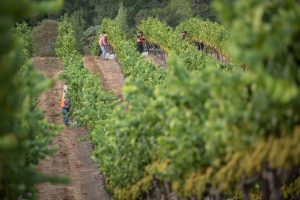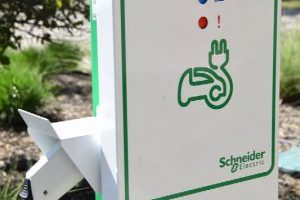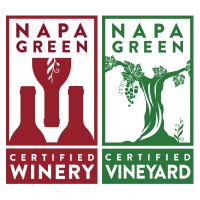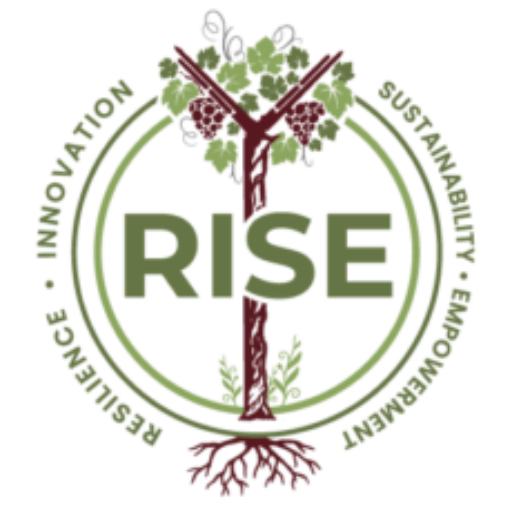Social
equity
SUSTAINABILITY LEADERSHIP PILLAR:
Social equity, Justice & inclusion
Since the early 1990s, when sustainability hit the stage as a critical element of business leadership, social equity was always inherent to being sustainable. We can’t have environmental or economic sustainability without social sustainability. Over time the equity element has been sidelined, and increasingly sustainability has become synonymous solely with environmental stewardship. In fact, real sustainability is about caring for the health and resilience of nature and environment, the health and resilience of employees and community, all of which contributes to the success and longevity of businesses.
In the wine industry, social equity focuses on issues like farmworker training, living wage, affordable housing, and opportunities for advancement. In addition, we have to acknowledge that industry leadership has been overwhelmingly white- and male-dominated. There are myriad opportunities to elevate diversity and inclusion, creating openings and opportunities for people of color (POC).
Here are some examples of how sustainable wineries and vineyards are addressing social equity, justice and inclusion:
- Encouraging and paying for workers to attend ESL, computer skills and other continuing education courses from groups like the Napa Valley Farmworker Foundation
- Having team leads participate in Diversity in Wine Leadership Forum workshops
- Arranging implicit bias training with groups like CircleUp Education
- Whenever possible, hiring farmworkers year-round, recognizing the value-add of their site-specific vineyard knowledge
- Leveraging the H-2A system (temporary agricultural employment of foreign workers) and hiring the same crew annually, providing them with work consistency and security
- Validating that Farm Labor Contractors are providing essential training, safety protocols and adequate housing (where relevant)
- Offering the vineyard team the opportunity to get inside the winery and engage with wine production, and in parallel offering the winery team the opportunity to get out in the vineyard and experience grape growing first hand
Chimney Rock Winery Story
We have two women leading an all-Latino winemaking team. Our small cellar team of six has all been here 15 plus years, with a 50:50 split of women to men. At least once a year we visit another winery that is a leader in sustainability. This helps keep everyone engaged and thinking about both low-hanging fruit and long-term dreams for saving water and energy, reducing emissions, and building resilience. Laura Orozco, our Assistant Winemaker, is bullish about recycling and composting and keeping the team trained. We focus on development and opportunities for advancement, and have a budget for education to support professional and personal growth. Edgar Lona joined as a cellar intern in 1997, and is now the Cellar Master & Facility Supervisor. We are working with The Roots Fund to hire interns for harvest to broaden and diversify our talent pool. We also try to be generous with work-life balance, especially with the home-schooling challenges during COVID. Napa Green has broadened our perspective of what sustainability really means – it is so much more than how we grow our grapes. Diversity and social inclusion are a part of our fabric, essential to sustain our business and make us better.
SOCIAL EQUITY, JUSTICE & INCLUSION champion Stories

Social Equity leadership
By definition, sustainability rests on three pillars – People, Planet, and Prosperity. All too often sustainability is simply equated with environmental stewardship, when in fact core to sustainability is the recognition that you cannot have environmental or economic sustainability without social sustainability.

Green Team Sustainability Leadership at Stagʹs Leap Wine Cellars
Stag’s Leap Wine Cellars has been Napa Green Certified from Soil to Bottle for over a decade. As a part of their commitment to continuing improvement, they have established a cross-departmental “Green Team” to engage and empower employees.

Three Napa Green Wineries Explore a Commuting Partnership
As part of Down to Earth Month, the NVV is promoting the Napa Commute Challenge and exploring what our members are doing to incentivize the use of alternative transportation to and from work. Cakebread Cellars, St. Supéry Estate Vineyards & Winery and Opus One have promoted the use of alternative transportation for some time, and are now looking toward the future.


